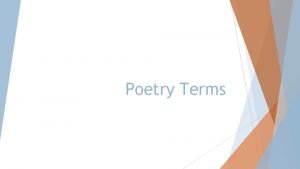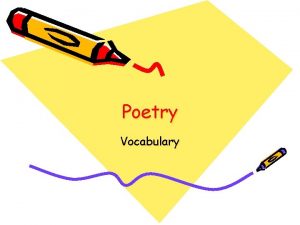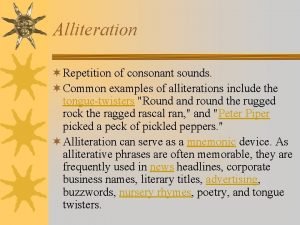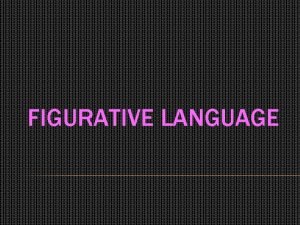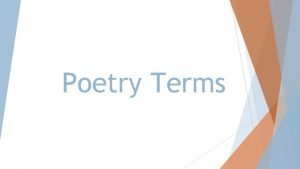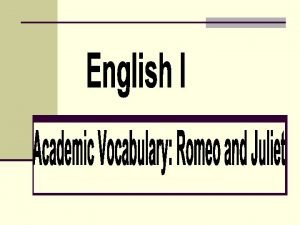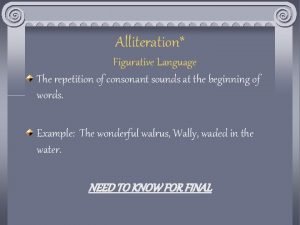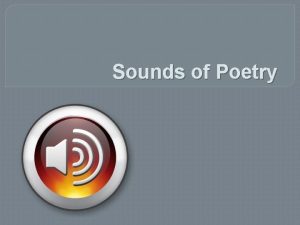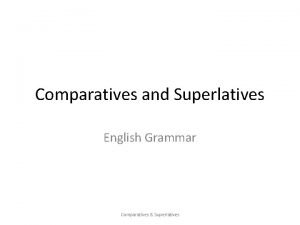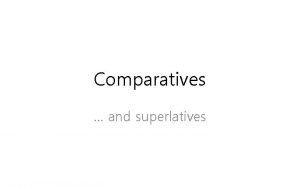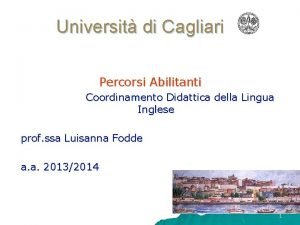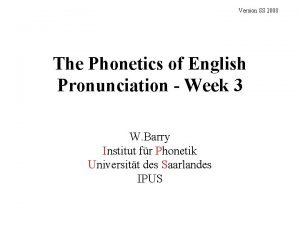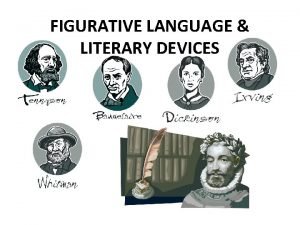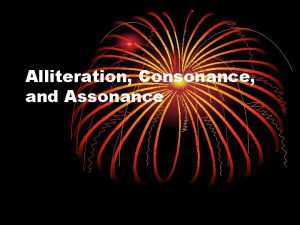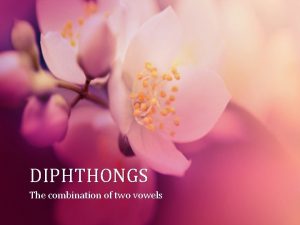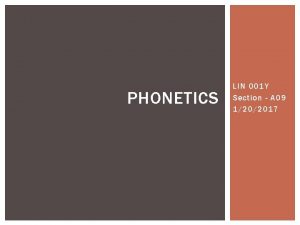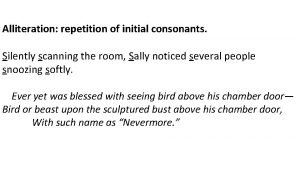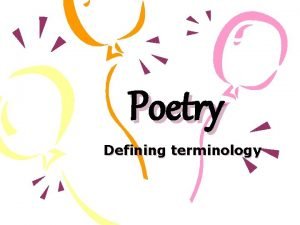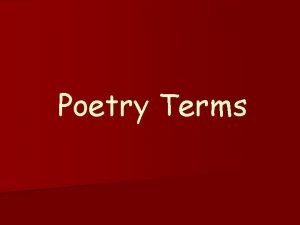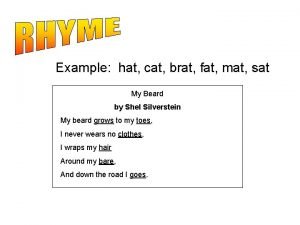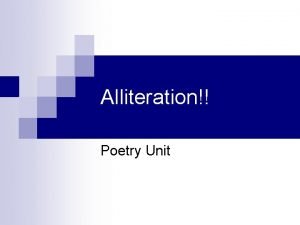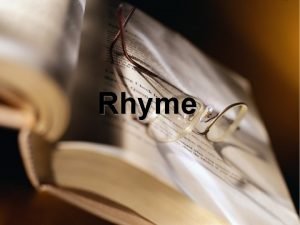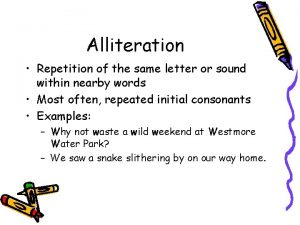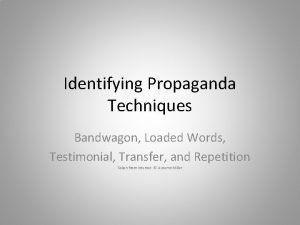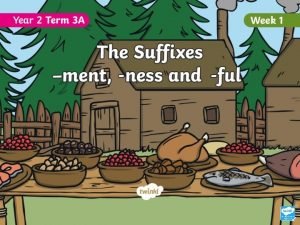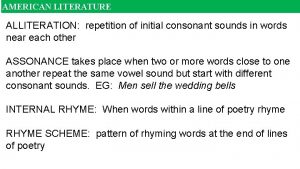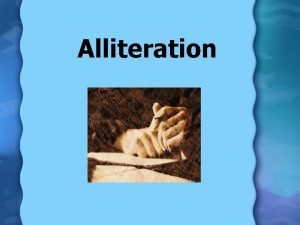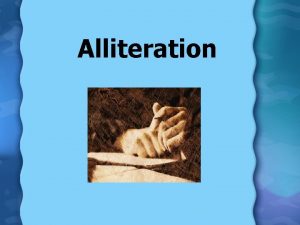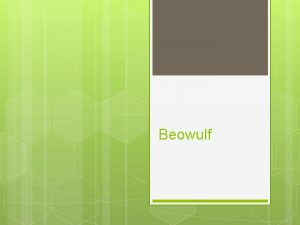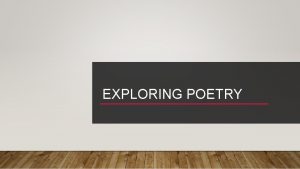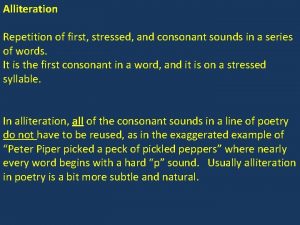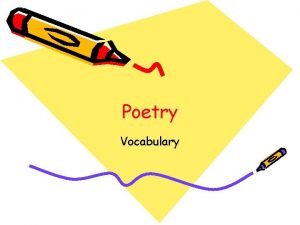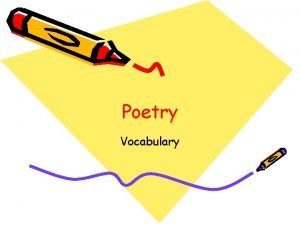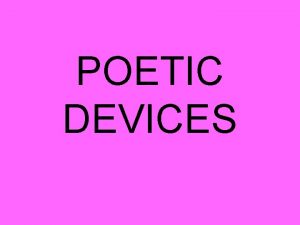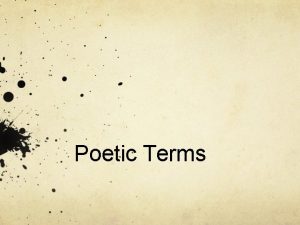Alliteration The repetition of the initial consonant sounds


































- Slides: 34

Alliteration • The repetition of the initial consonant sounds Example: In cliches: sweet smell of success, a dime a dozen, bigger and better, jump for joy Wordsworth: And sings a solitary song That whistles in the wind.

Allusion A reference to a well-known person, place, event, literary work, or work of art. Example: “…and just as the Apostle Paul left his village of Tarsus and carried the gospel of Jesus Christ to the far corners of the Greco Roman world” Letter from Birmingham Jail, Dr. Martin Luther King

Analogy • A comparison between two or more things that are similar in some ways, but otherwise unalike (a metaphor). “I am going to be toast when I get home. ” This is usually said when someone is in trouble with their significant other.

Anaphora • The deliberate repetition of a word or phrase at the beginning of several successive verses, clauses, or paragraphs. One of the devices of repetition, in which the same phrase is repeated at the beginning of two or more lines. • Example: “I don't like you sucking around, bothering our citizens, Lebowski. I don't like your jerk-off name. I don't like your jerk-off face. I don't like your jerk-off behavior, and I don't like you, jerk-off. " (Policeman in The Big Lebowski)

Antistrophe • repetition of the same word or phrase at the end of successive clauses. Example: “In 1931, ten years ago, Japan invaded Manchukuo -without warning. In 1935, Italy invaded Ethiopia -without warning. In 1938, Hitler occupied Austria -without warning. In 1939, Hitler invaded Czechoslovakia -- without warning. Later in 1939, Hitler invaded Poland -- without warning. And now Japan has attacked Malaya and Thailand -- and the United States --without warning. “ Franklin D. Roosevelt

Antithesis • opposition, or contrast of ideas or words in a balanced or parallel construction. Example: “Extremism in defense of liberty is no vice, moderation in the pursuit of justice is no virtue. ” Barry Goldwater

Aphorism • a brief saying embodying a moral, a concise statement of a principle or precept given in pointed words. Example: “Imitation is suicide. ” Emerson “Lost Time is never Found again. ” Franklin

Characterization • the method used by a writer to develop a character. The method includes (1) showing the character's appearance, (2) displaying the character's actions, (3) revealing the character's thoughts, (4) letting the character speak, and (5) getting the reactions of others. Direct and Indirect Characterization Example: “The patient boy and quiet girl were both well mannered and did not disobey their mother. ”

Connotation • is an implied meaning of a word; the emotional content of a word; the meaning beyond its literal meaning/definition Example: Wall is defined as “ a solid structure that defines or protects an area. ” What images or experiences can you associate the word with? Does the word have a positive or negative connotation?

Diction • The author’s word choice, including the vocabulary used, the appropriateness of the words, and the vividness of the language Diction can be: Objective/Formal/Unemotional “The lawn started at the beach and ran toward the front door for a quarter of a mile” The Great Gatsby Subjective/Informal/Emotional There was a slow, pleasant movement in the air, scarcely a wind, promising and cool lovely day. ” Diction=Tone=Mood

Epithet • any word or phrase applied to a person or thing to describe an actual or attributed quality. Example: “Richard the Lion-Hearted” is an epithet of Richard I.

Euphemism • the substitution of a mild, indirect, or vague expression for one thought to be offensive, harsh, or blunt. Example: Passed away=has died Between jobs=unemployed Oven in the bun=pregnant

Foil • When the traits of one character contrast those of another. Example: Romeo foils Tybalt because Romeo is compassionate and level-headed and Tybalt is fiery and quick to react. Think of how Sula and Nel foils one another.

Foreshadowing • Hints or clues that provide insight into what will occur in the future. Example: The plaque of robins when Sula returns could foreshadow her death.

Imagery • Language that appeals to the senses: sight, touch, hear, smell, taste Example(s): sight: The rose is bright red with a hint of pink. hearing: It sounds like the chirping of several birds, with their high voices. smell: The air smells like going to the countryside, fresh and green. There is no smell of smoke, but the fresh waters and the leaves. touch: It feels bumpy, yet gives off a welcoming warmth. taste: It tastes sweet, yet spicy at once, with a tinge of orange taste.

Irony • an implied discrepancy between what is said and what is meant. Three kinds of irony: 1. verbal irony is when an author says one thing and means something else. 2. 2. dramatic irony is when an audience perceives something that a character in the literature does not know. 3. 3. irony of situation is a discrepency between the expected result and actual results. Example: The town of Medallion is called “the Bottom, ” but it is located in the hills. What type of irony is this?

Juxtaposition • When one idea, theme, or person is paralleled to another. It is used to emphasize contrast. It is the ACT of placing two concepts side by side (parallel). Example of a statement using juxtopose. Ms. Bradley required us to juxtapose two passages from Sula in order to see the difference between Sula and Nel.

Metaphor • A comparison of two or more unlike things. Example: My students are blossoming rosebuds.

Mood • The feeling the reader gets from the author’s tone/reading the story; the atmosphere. Can be described by using an adjective. Example: “The niter” I said; “ see, it increases. It hangs like moss upon vaults. This creates an eerie mood.

Onomatopoeia • Words that represent the sounds they imitate. Example: “Buzz, ” “Bang, ” “Zoom” “Snap”

Metonymy • Reference to something or someone by naming its attributes. Example: The pen is mightier than the sword We await word from the crown As I walked on Wall Street, I was passed by many of the mighty suits.

Motif • A recurring theme, idea, or character type within a text. Example: A motif of Sula is failed relationships. What are some other motifs?

Epistrophe • Repeated word or phrase at the end of successive lines, clauses, or sentences. Example: “What lies behind us and what lies before us are tiny compared to what lies within us. " Emerson

Hyperbole • Extreme exaggeration Example: “It is hot as Hades in this classroom!” “Everybody and his/her mama was at the party!”

Oxymoron • Placing two contradictory words/ideas together. Example: “I have bitter sweet memories of that time. ” “She is an educated dummy. ”

Paradox • A statement/idea that seems contradictory, but that actually may be true Example: “I’m a liar. How do you know that I am telling the truth. ” “This is a man’s world. ” Does Sula serve as a paradox?

Personification • To give non-human things human like qualities. Example: “The eyes of the bus pierced my soul as I ran across the street. ” “The walls screamed for a new paint job. ”

Point of View • The perspective from which a story is told. Example: 1 st person narrative-story is told in the narrating characters own voice (“I, ” “ours”) 3 rd person limited-the story is told from the view point of one character (“she” “he”) 3 rd person omniscient-the reader can see thoughts of ALL characters (“she” “he”)

Simile • A comparison of two or more unlike things using “like” or “as” Example: My students’ futures are as bright as the sun!”

Symbol(ism) • When one object represents another object or abstract idea Example: The color red usually symbolizes passion and love. A book symbolizes knowledge.

Synecdoche • To use a part to represent the whole. Example: I took a ride in his new wheels. The farmer rounded up the head of cattle. Please lend me your ears for a moment.

Syntax • Rules of grammar; the way words are put together to form clauses, phrases, sentences While reading a text, ask yourself what types of sentence and diction does the author use? Compound, simple, complex, compound complex and/or Simple and figurative or complex langauge

Theme • The implied message of a text. Example: One possible theme of Romeo and Juliet is that “Actions lead may emotion can end in a tragedy. ” OR “The grudges we hold with others can impact our children’s lives. ”

Tone • The author’s attitude about the subject. Example: “The niter” I said; “ see, it increases. It hangs like moss upon vaults. The tone of this statement is deceptive and cynical. Diction=Tone=Mood NOTE: Whenever describing the tone of a text, provide the adjective to describe the tone and the examples of the words/diction used in the text that display(s) the tone.
 Repetition of two consonant sounds
Repetition of two consonant sounds The repetition of initial consonant sounds
The repetition of initial consonant sounds The repetition of beginning consonant sounds.
The repetition of beginning consonant sounds. Difference between alliteration and repetition
Difference between alliteration and repetition Repetition of beginning sounds of words.
Repetition of beginning sounds of words. Here comes the sun figurative language
Here comes the sun figurative language The repetition of beginning consonant sounds in words
The repetition of beginning consonant sounds in words Alliteration v
Alliteration v Is alliteration figurative language
Is alliteration figurative language Why do poets use onomatopoeia
Why do poets use onomatopoeia Friendly superlative
Friendly superlative Dangerous adjective comparative
Dangerous adjective comparative Language
Language 24 consonant sounds in english with examples pdf
24 consonant sounds in english with examples pdf Consonant sounds
Consonant sounds Sound device alliteration
Sound device alliteration Repeated beginning sounds
Repeated beginning sounds The difference between alliteration and consonance
The difference between alliteration and consonance Closing diphthongs
Closing diphthongs Oral sounds and nasal sounds
Oral sounds and nasal sounds The repetition of initial consonants
The repetition of initial consonants Alliteration poetry definition
Alliteration poetry definition Assonance
Assonance Repitition of sounds
Repitition of sounds What is alliteration in a poem
What is alliteration in a poem Simple short poem on water
Simple short poem on water Element of poetry
Element of poetry Repetition of internal vowel sounds
Repetition of internal vowel sounds Repetition of the same beginning sound
Repetition of the same beginning sound Repetition of ending sounds of words
Repetition of ending sounds of words Examples of testimonial propaganda
Examples of testimonial propaganda What is alliteration and repetition
What is alliteration and repetition Alliteration and repetition
Alliteration and repetition Suffixes
Suffixes Consonant suffix
Consonant suffix
